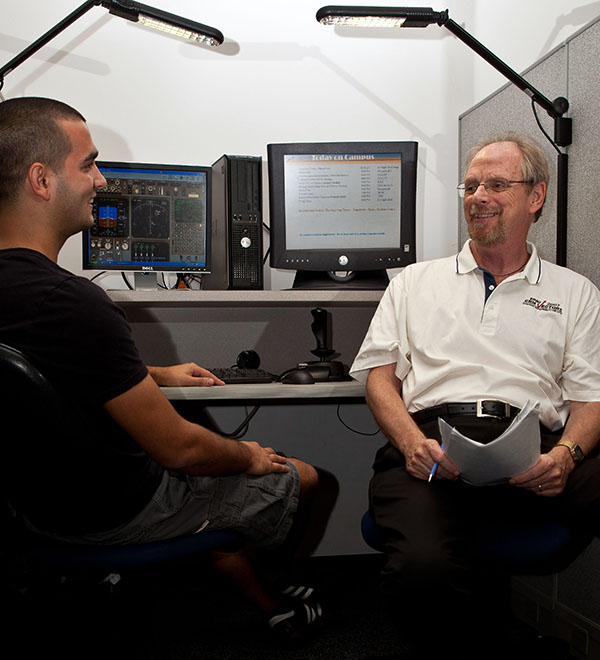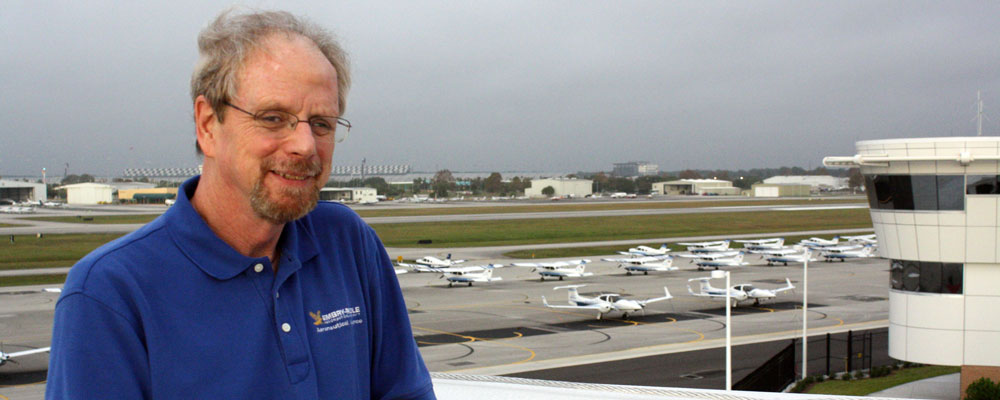Embry-Riddle Professor of Aeronautical Science Ted Beneigh multiplies the impact of giving by investing in future faculty
 Ted Beneigh believes that Henry David Thoreau had it right when he advised, “Go confidently in the direction of your dreams.”
Ted Beneigh believes that Henry David Thoreau had it right when he advised, “Go confidently in the direction of your dreams.”
The aeronautical science professor at Embry-Riddle’s Daytona Beach Campus hopes to allow others to do the same with a planned gift that supports faculty in the Aeronautical Science department. “What I think I can do the most to help students is keep my fellow faculty at the cutting edge of their professions,” says Beneigh.
The decision to support faculty instead of students directly may seem counterintuitive at first glance, but for Beneigh, it’s simple math:
“Let’s say I wanted to donate $15,000 for a scholarship and two students get that. The benefit of that scholarship would be two students,” says Beneigh. “But if I gave that $15,000 to the entire department and they send ten faculty to different programs, and each of those faculty has 30 students in the classroom, now I have affected 300 students, rather than two.”
Beneigh’s rationale comes from years of firsthand experience as a faculty member at Embry-Riddle. Over his 35-year career, he has amassed an impressive teaching career that includes stints as a flight instructor, flight standards director and now as a professor of aeronautical science, where he has helped launch a new bachelor’s degree program in Unmanned Aircraft Systems (UAS) Science.
Working with the new UAS degree program has had a lot to do with Beneigh’s decision to support faculty with his gift. “The only way I was able to help develop the degree program was to go out and learn it,” says Beneigh. “And somebody—in this case, the university—had to pay for it.”
Beneigh hopes that his gift will ease the university’s financial burden a little and allow faculty to have the means to enhance their education and then pass that on to students.
“If I can help ten faculty, you are probably talking numbers in the hundreds, even thousands of students who could be helped, depending on the magnitude of what faculty are doing,” Beneigh says. “That investment’s impact is going to multiply many times over.”
Together with his wife, Deborah, Beneigh started considering their gift after receiving the university’s planned giving newsletter, which directed them online to Embry-Riddle’s Will Planner (ergiftplan.org), a free service that helps users gather the information they need to begin their estate planning. After filling out the planner, Beneigh took the information to his personal estate planner and started the process that set the gift in motion.
“My wife and I don’t have any children, so I thought, ‘Why not let what we’ve earned live on past us in whatever way or shape or form we could do it?’” Beneigh says. “My wife agreed with me, and we established our gift plan for Embry-Riddle.”
Not surprisingly, Beneigh hopes what lives on from his gift turns out to be much larger than his original investment. “Helping the university is not only about helping those people who are making their careers; it’s also about improving a society that relies heavily on aviation,” he says.
“We have one of the best aviation systems in the world, and the reason we do is exactly because of Embry-Riddle—because we train the people who make our aviation system great. Helping Embry-Riddle does a whole lot more than just help one person get a job doing what they like to do. It helps improve society as a whole.”

